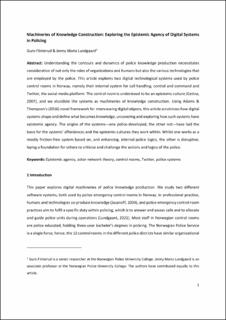Machineries of knowledge construction: Exploring the epistemic agency of digital systems in policing
Peer reviewed, Journal article
Accepted version
Permanent lenke
https://hdl.handle.net/11250/3120089Utgivelsesdato
2023Metadata
Vis full innførselSamlinger
Originalversjon
10.5553/EJPS.000010Sammendrag
Understanding the contours and dynamics of police knowledge production necessitates consideration of not only the roles of organizations and humans but also the various technologies that are employed by the police. This article explores two digital technological systems used by police control rooms in Norway, namely their internal system for call handling, control and command, and Twitter, the social media platform. The control room is understood to be an epistemic culture, and we elucidate the systems as machineries of knowledge construction. Using the novel framework for interviewing digital objects from Adams and Thompson’s, Researching a posthuman world, this article scrutinizes how digital systems shape and define what becomes knowledge, uncovering and exploring how such systems have epistemic agency. The origins of the systems – one police-developed, the other not – have laid the basis for the systems’ affordances and the epistemic cultures they work within. While one works as a mostly friction-free system based on, and enhancing, internal police logics, the other is disruptive, laying a foundation for others to criticize and challenge the actions and logics of the police.
